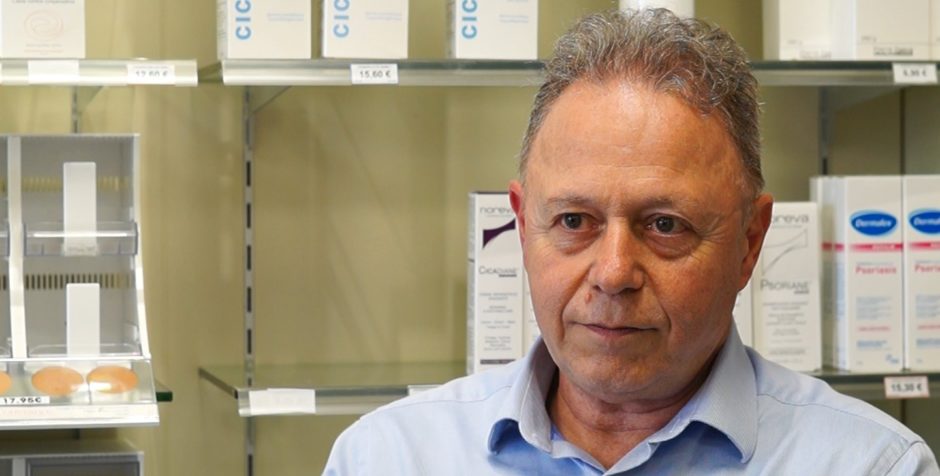

Application to the ECHR: For a Conscientious Objection for Pharmacists
Pharmacist to ECHR: Conscientious Obj
The ECLJ, with the help of Adeline le Gouvello de La Porte, esq. wrote and lodged the formal application of Bruno Pichon, pharmacist, at the European Court of Human Rights concerning the violation of his freedom of conscience. He had been condemned in 2016 for refusing to sell an IUD because of the contragestive effects of that product.
Summary:
Recap of the Bruno Pichon case
The video on pharmacists confronted to the obligation to sell contragestive products
Food fo thought regarding conscientious objection
About the effects of the “emergency contraception”
Recap of the Bruno Pichon case

Mr Pichon was a pharmacist working near Bordeaux. On 23rd April 2015, a client came to his pharmacy and asked for the issuing of an IUD which had been prescribed to her 5 months earlier.
The employee who saw her explained that they did not have it in stock, and specified that the owner of the pharmacy had made the choice not to issue such products. The client demanded explanations and Mr Pichon then explained to her the mode of operation of the IUDs and that, according to the information given by the labs, IUDs notably prevent the implantation of the human embryo. Taking place after the fertilisation, this device prevents the continuing of the pregnancy and therefore poses a problem of conscience to him as a pharmacist. He told her, respectfully, that she was of course free to choose and could get the IUD from the many nearby pharmacies.
Many studies have been published on the mode of action of the IUD and describe its effect not only contraceptive (it aims to prevent conception) but also contragestive (intervening if necessary after the conception, it prevents the implantation of the embryo in the uterus).
By mail received on April 27, 2015, the client referred this “incident” to the College of Pharmacists, considering that the pharmacist had no right to refuse to sell the IUD. By letter of 11 June 2015, the President of the Regional Council filed a complaint against Mr Bruno Pichon.
In a decision of 11 February 2016, the Regional Council of the College of Pharmacists of Aquitaine meeting in disciplinary Chamber pronounced against Mr. Pichon the sanction of the prohibition to practice pharmacy during a period of one week. Mr. Pichon made an appeal of this decision.
Simultaneously with this procedure, and concomitantly with this case, an extensive survey was conducted among pharmacists, by the National Pharmacists Association, between December 3, 2015 and January 15, 2016, as part of the update of the code of pharmacists’ professional ethics (article L. 4231-1 and following of the Code of Public Health). This survey revealed that 85% of pharmacists want the explicit recognition of their freedom of conscience by mentioning the “conscience clause” in their code of ethics; the pharmacist being the only health professional in France dealing with the problems of beginning and end of life to be deprived of such recognition.
On 21 July the National Council of the College of Pharmacists then resolved, under political and media pressure, to suspend the procedure of consultation of pharmacists on the project of introducing a conscience clause in the code of ethics of the profession (press release of 21 July).
By a decision of 24 July 2017, the Disciplinary Chamber of the National Council of the Order of Pharmacists rejected Mr Pichon’s appeal, ruling that “a pharmacist cannot make prevail and impose his moral and religious beliefs by invoking Articles 9 and 10 the European Convention for the Protection of Human Rights and Fundamental Freedoms, which guarantees freedom of conscience and religion and respect for life and the human person to justify the refusal to detain and sell contraceptive medical devices”.
Mr Pichon then lodged an appeal at the Court of Cassation, relying in particular on Articles 9 and 14 of the European Convention on Human Rights. The appeal was the subject of a preliminary procedure of admission at the end of which the Council of State declared the appeal inadmissible, without examination on the merits of the means invoked.
Even though the prohibition to practice pharmacy for a week may seem like a light sentence, the true significance of this sentence is that it imposes on Mr. Pichon to sell IUDs and all other similar product (such as the morning-after pills) in the future, that is to say that this condemnation places him in the obligation to violate his conscience or to leave his profession.
Tired by these ordeals, unable to practice his profession in the respect of his moral convictions and with serenity, Bruno Pichon was forced to leave his profession at the age of 63, five years before the deadline he had set. He has sold his pharmacy and is no longer registered as a pharmacist.
A violation of his rights

By punishing Mr. Pichon because of his conscientious objection to the sale of IUDs, the Disciplinary Chamber of the National Council of the College of Pharmacists violated his right to respect of his freedom of conscience. Mr. Pichon was punished not only for refusing to sell an IUD but also for simply not keeping a stock of it in his pharmacy.
But like any professional salesman, the pharmacist can manage his stock as he sees fit. No standard requires pharmacists to hold certain products in stock. In terms of contraceptive, the Court of Cassation has also recognized that the refusal to sell a contraceptive is not punishable if the pharmacist does not have the product requested: “no legal text requires a pharmacist to take the initiative to propose to a customer to order a merchandise that he does not have in stock” (Cass Crim, June 16, 1981, no. 80-93.379). The Court of Appeal of Paris also reminded, in terms of IUDs “that no obligation relies on a pharmacist to hold such a product in his stock” (Paris, 8 December 1993, no. 93/03941). Moreover, it is impossible, both materially and financially in the pharmaceutical field to have all the products in stock.
In addition, by penalizing the applicant for his refusal to “sell” IUDs, the French courts seriously violated his freedom of conscience.
Indeed, freedom of conscience and religion guarantees not only the positive freedom to manifest (in the external forum) its convictions by acting in accordance with them, but also the negative freedom to not be compelled to act against their convictions. This negative freedom is exercised by conscientious objection, it protects the internal forum.
The right to conscientious objection is widely recognized by legislators and courts, especially regarding actions that may be harmful to human life, such as military service, abortion, euthanasia, or research on the embryo. The ECHR has also recognized this, in particular with regard to abortion, by saying that “States are obliged to organize their health care system in such a way as to ensure that the effective exercise of the freedom of conscience of health professionals in the context of their duties does not prevent patients from accessing the services to which they are entitled under the applicable legislation” (ECHR, 26 May 2011, No. 27617/08, R. R. v. Poland, § 206, ECHR, 30 Oct. 2012, No. 57375/08, P. and S. v. Poland, § 106). The Court considered that it is for the State to establish a mechanism allowing the respect and the conciliation of the freedom of conscience of the health professionals and the interests of the patients. Nicolas Hervieu rightly notes that in the first “Pichon and Sajou v. France case, the “conscientious objection” dimension had been completely hidden: the Court’s solution should therefore be read in the light of these new developments (R. R. v. Poland and Bayatyan). In my opinion, if such litigation is again submitted to the Court and if it follows the logic of its 2011 judgments, it should not so much ensure a balance between two individual claims (freedom of conscience v. obtaining the pill) but verify that the State Party itself has acted sufficiently to ensure this balance (which is significantly different). The European court will verify that despite the wish of a health professional to exercise his right to conscientious objection, the overall organization of the health system in the territory nevertheless enables patients to obtain access to the health services which they are entitled under the applicable legislation.” (N. Hervieu, discussion of the article “Conscientious objection before the ECHR”, August 2011, http://thomasmore.wordpress.com).
Recently, and in numerous occasions, the Parliamentary Assembly of the Council of Europe has firmly reminded States of their obligation to respect freedom of conscience in the professional sphere, particularly regarding abortion (see resolutions 1763 of 7 October 2010 on “Right to conscientious objection in the context of legal medical care”, No. 1928 of 24 April 2013, §9.10: No. 2036 of 29 January 2015, §6.2.2).
However, in the present case, even though the respect and conciliation of the rights and interests of Mr Pichon and the client would have caused no difficulty, the authorities failed to comply with the positive duty of conciliation and preferred to punish Mr Pichon.
Indeed, the exercise by Mr Pichon of his freedom of conscience did not bring real harm to others: the prescription of the client, made in the big city of Bordeaux and dating back more than 5 months, had nothing urgent. The “monopoly” of pharmacies is only legal and non-factual, as there are about 100 of them within 10 km of Mr Pichon’s pharmacy. This ‘monopoly’ cannot therefore be invoked to justify an infringement on pharmacists' freedom of conscience.
The absence of any prejudice is all the more evident as the client did not join the complaint of the President of the College of Pharmacists. It therefore appears very clearly that Mr Pichon was not prosecuted because of a hypothetical damage caused to others, but only because of his own convictions. On the other hand, his personal prejudice is very heavy: he has been condemned, publicly exposed in the national press, had his reputation tarnished, has been harassed to the point of filing a complaint. Moreover, the practice of his profession has become impossible for him: Mr Pichon was confronted with a “serious and insurmountable conflict” of conscience (Bayatyan v Armenia, GC, § 110) to the point of being forced to leave his profession (Doc. No. 19), even though this Court has held that the faculty of changing jobs is not a sufficient guarantee of freedom of conscience and religion (Eweida and others v United Kingdom, § 83).
Moreover, Mr Pichon was discriminated against by other health professionals in that French law guarantees them freedom of conscience, to the exclusion of pharmacists. In fact, doctors, midwives and nurses have the right to refuse their care for professional or personal reasons (articles R4127-47, R4127-328 and R 4312-12 CSP). This right is expressly recalled regarding abortion and extended to all medical auxiliaries (Article L.2212-8 CSP), but does not benefit pharmacists who are as committed morally as the prescribing physicians. This difference in treatment is devoid of any legitimate motive, even though it causes a serious interference in the enjoyment of the applicant's freedom of conscience. It constitutes a clear violation of the Convention.
Although it is mainly described as a contraceptive, the IUD is also likely to act after the conception, and thus to interrupt a human life, by preventing the implantation of the fertilized egg by provoking an inflammation of the endometria of the mother (French National College of Gynecologists and Obstetricians 2006, doc 22, HAS synthesis of contraceptive methods, March 2013, p.27, doc 23, list of IUD studies, doc 24). However, “every human ovum must, from the stage of its fertilization, be considered as a “human embryo” (...), since this fertilization is likely to trigger the process of development of a human being” (CJUE, Oliver Brüstle v. Greenpeace eV, C-34/10, 18 October 2011, §35). In addition, “embryos cannot be reduced to “goods” (Parillo v. Italy, GC, No. 46470/11, 27 August 2015, §215), they deserve respect. PACE has defended the “rights of every child to life from the moment of his conception” (Rec 874 (1979) and stressed later that “as soon as the ovum is fertilized, human life develops continue” (PACE, ECR 1046/1986).
Although it is not for the Court to decide on the legitimacy of a conviction (Refah Partisi v. Turkey, GC, §91), the refusal to participate in the interruption of the development and life of a human embryo is a legitimate case of conscientious objection. There is no doubt that Mr Pichon's convictions are rational and reach “a sufficient degree of force, seriousness, consistency and importance to the application of the guarantees of Article 9” and that his objection is not motivated by “personal interest or personal suit” (Bayatyan v. Armenia, GC, §§ 110 and 124). His freedom of conscience ought therefore to be respected.
Video: "the violated conscience of pharmacists". English subtitles available.
Food for thought regarding conscientious objection

Grégor Puppinck, Conscientious Objection and Human Rights: A Systematic Analysis, Brill, 2017.
Grégor Puppinck, Brief Presentation on Conscientious Objection, 2016.
PACE Resolution n°1763: "The Right to Conscientious Objection in Lawful Medical Care" (2010).
La Liberté de conscience des pharmaciens dans l’exercice de leur profession, Claire de La Hougue, in: Mélanges en l'honneur du Professeur Emmanuel Decaux, "Réciprocité et universalité - Sources et régimes du droit international des droits de l'homme", A. Pedone, 2017.
Oral intervention of the UN Special Rapporteur on Freedom of Religion or Belief, during a Side event at the UN, Geneva on March 2016:
About the effects of the "Emergency contraception"

Pharmaceutical and other industrial groups claim that the so-called "morning-after pills", or “emergency contraception”, are products that have only an anti-ovulatory and spermicidal effect, but are not contragestive. Against this assertion, we reproduce here a paragraph supported by numerous studies of “the American College of Pediatricians”
4. Potential mode of action of EC includes abortion. What are the modes of action of “emergency contraception?” Do they act solely by preventing fertilization or do they also act to prevent the survival of an embryo – before, during or after implantation? Sperm are rapid swimmers; some reaching the ampulla of the oviduct within 5 minutes of coitus,29 and actions to prevent ovulation cannot be effective when ovulation has occurred in the 12-24 hours preceding intercourse. EC is widely promoted as not being “abortificient” (with the term “abortificient” limited to an agent that interferes with an implanted embryo/established pregnancy.”) However, Ulipristol (Ella) is a second generation progesterone antagonist, similar in action to its predecessor, mifepristone, (also known as the abortion pill and used for EC in some other countries) It may have a direct effect on implantation with abortificient potential30,31 ; even the AAP recommends a negative pregnancy test prior to its use.32 Both Mifepristone and Ella are labeled as pregnancy category X. Levonorgestrel (LNG-EC) (Plan B, Next Choice) has been promoted as not interfering with implantation or disturbing an established pregnancy, however recent studies and critical review of earlier studies offer convincing evidence that LNG-EC taken prior to ovulation prevents ovulation during the following five days (survival time of sperm) only 20% of the time,33 does not interfere with sperm function at in vivo doses, and consistently results in an inadequate corpus luteum and shortened luteal phase. While it has been theorized that luteal insufficiency makes some ova dysfunctional,34 there is no good evidence to support this theory while there is evidence that luteal insufficiency effectively prevents successful implantation of the embryo resulting in its death.35 Those studying LNG-EC continue to debate the issue. High doses of combined oral contraceptives (Yuzpe method) act primarily by suppressing ovulation but do not do so consistently; it has also has been shown to result in endometrial abnormalities;36 whether it has post-fertilization effects is also subject to debate.37 Please see Appendix A for a more thorough discussion of the evidence.
The College opposes any methods of EC whose modes of action include causing the death of a human embryo, whether pre- or post- implantation. The College further recommends that individuals and families considering using EC be fully informed of the possible modes of action of EC including post-fertilization whether pre-/peri-/ or post-implantation.
29 Moore KL. The Developing Human. 8th ed. Philadelphia, PA: Saunders; 2008:29.
30 Assessment Report for Ellaone. CHMP ASSESSMENT REPORT. http://www.ema.europa.eu/docs/en_GB/document_library/EPAR_-_Public_assessment_report/human/001027/WC500023673.pdf. 2009. Accessed February 24, 2012.
31 US Food and Drug Administration. Ella (ulipristal acetate) tablet prescribing information. http://www.accessdata.fda.gov/drugsatfda_docs/label/2010/022474s000lbl.pdf. November 26, 2012.
32 American Academy of Pediatrics. Emergency Contraception COMMITTEE ON ADOLESCENCE. Pediatrics. 2012; 130(1174).http://www.sbp.com.br/pdfs/POLICY_STATEMENT_Emergency_Contraception.pdf . Published online November 26, 2012.
33 Noé G et al., é et al., “Contraceptive Efficacy of Emergency Contraception with Levonorgestrel Given Before or After Ovulation,” Contraception 84.5 (November 2011):, 488. (cited in ncb…p.21 )
34 H. B. Croxatto et al., “Pituitary–Ovarian Function following the Standard Levonorgestrel Emergency Contraceptive Dose or a Single 0.75-mg Dose Given on the Days Preceding Ovulation,” Contraception 70 (2004): 442–450; W. M. Verpoest et al., “Relationship between Midcycle Luteinizing Hormone Surge Quality and Oocyte Fertilization,” Fertility and Sterility 2373.1 (January 2000): 75–77.
35 Peck R and Velez JR. The Postovulatory Mechanism of Action of Plan B: A Review of the Scientific Literature” The National Catholic Bioethics Quarterly Winter 2013. 1-35. http://ncbcenter.org/document.doc?id=584 accessed Jan 23, 2014.
36 E. G. Raymond et al., “Effect of the Yuzpe Regimen of Emergency Contraception on Markers of Endometrial Receptivity,” Human Reproduction 15.11 (November 2000): 2351–2355.
37 Refs: Kahlenborn C et al. Postfertilization effect of hormonal emergency contraception. Annals Pharm 36(3) march 2002: 465-470.; Crockett SA, Harrison D DeCook J. Harsh C. Hormone contraceptives: controversies and clarifications. April 1999 available by emailing prolifeob@aol.com
Translation by BMG













